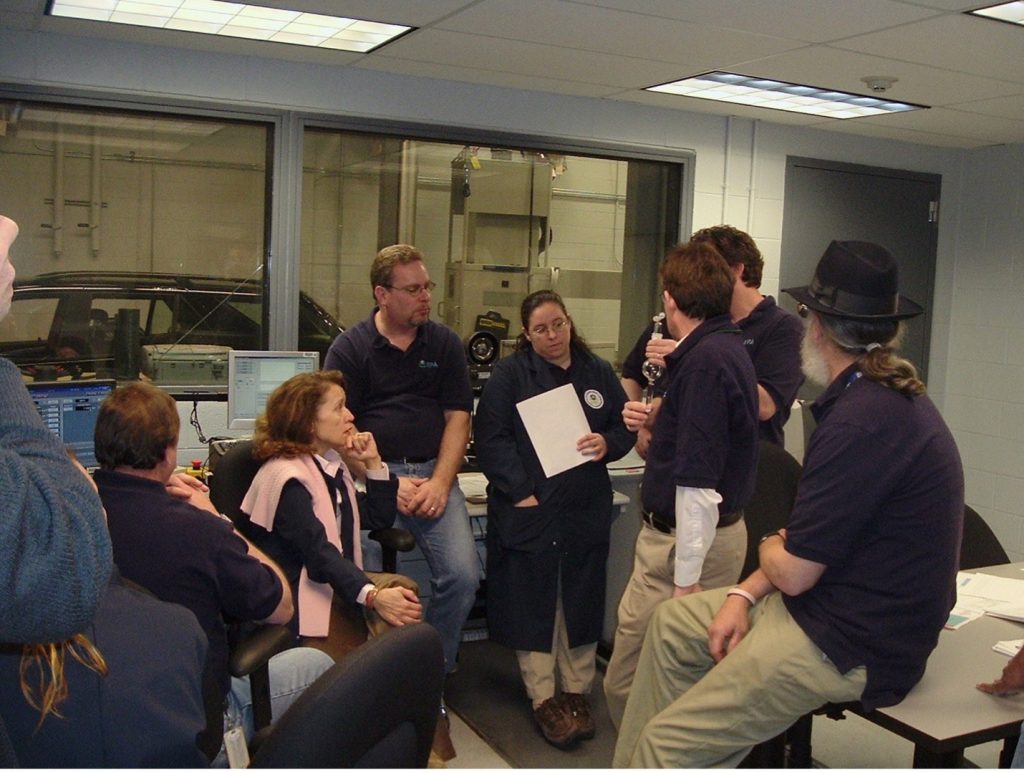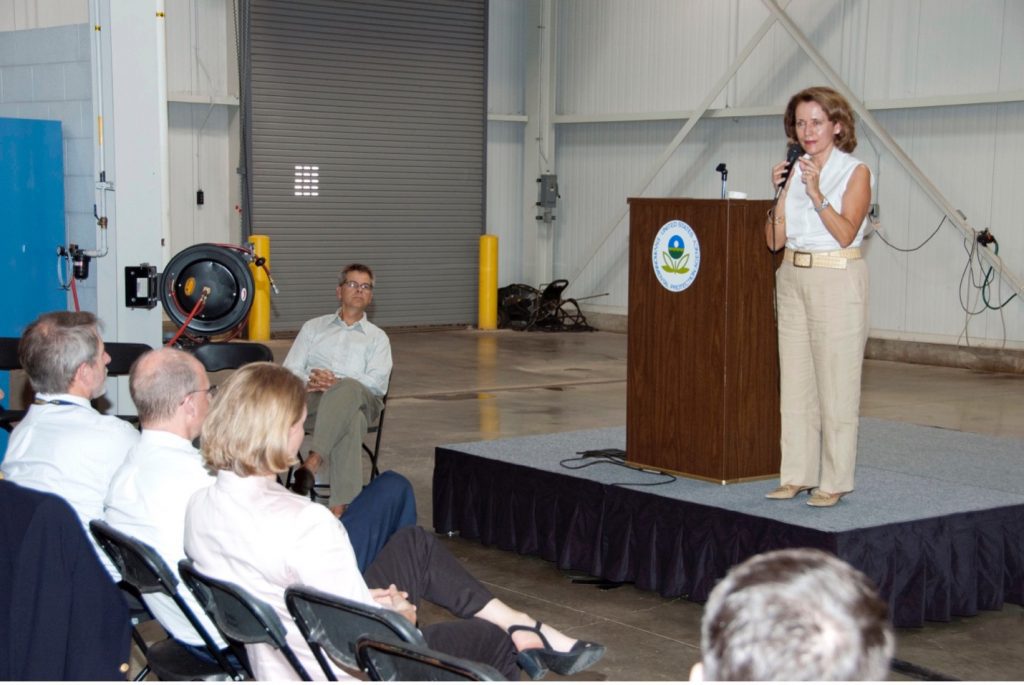After serving for 42 years at the U.S. Environmental Protection Agency (EPA), Chris Grundler has joined the Crux Alliance as a Senior Advisor. In this interview, Chris speaks with Margo Tsirigotis Oge, who served at the EPA for 32 years, including 18 years as Director of the Office of Transportation and Air Quality. Chris and Margo discuss the role of expert, technical organizations—like the members of the Crux Alliance—in supporting effective policy design. Margo is widely recognized as having been a key architect of the EPA’s successful efforts to reduce air pollution and greenhouse gas emissions from vehicles. Chris served as her deputy for 17 years before succeeding her as Director.
Margo, you were in charge of regulating the vehicle and fuels sector at the EPA for many years, and were responsible for many precedent-setting pollution standards during your time. What role did technical NGOs play in contributing to your success?
When I led the EPA’s Office of Transportation and Air Quality, our strategy from the beginning was to work with all stakeholders—the regulated industry, states (especially California), and environmental and public health organizations. It was important to us to consider everyone’s input. And while the advocacy efforts of NGOs are important, what is often critical to our work is technical input—data and analysis. The regulated industry always had a lot of resources to pay for analyses—and much of it tended to show negative economic and consumer consequences of stronger pollution standards. In contrast, technical NGOs would provide us with unbiased research that often helped to corroborate and the EPA’s analyses, showing that the environmental, public health, and consumer benefits of our rules far exceeded the costs. The role of technical NGOs is more important than ever because of the worsening climate crisis.

The EPA has a couple of consequential regulations it is about to issue this spring, one for passenger cars and another for commercial trucks. What is at stake, and are you optimistic that the EPA will finalize strong rules to protect the climate and clean air?
Reducing planet-heating gases requires significant changes in cars and trucks; governments are no longer asking companies to simply add pollution control equipment. I am optimistic that in the U.S., California and the EPA will be successful with their multi-pollutant rules for cars and trucks because for the first-time policymakers and the majority of car and truck manufacturers are moving in the same direction away from fossil fuels. Globally, the industry is investing over $1 trillion in zero-emission technologies, so the question is not which direction we are heading, but how fast the transition can be achieved. In the U.S., the Inflation Reduction Act and the Bipartisan Infrastructure Law will accelerate the pace because their incentives (or “carrots”) reduce the cost of the transition. Next to this legislation, the upcoming EPA car and truck rules will be the single most important climate action the U.S. will have taken so far.
You are the former Board Chair of the International Council on Clean Transportation (ICCT), the Crux Alliance’s lead on vehicles, and you oversaw a doubling of ICCT staff and resources. What has been key to the success of the ICCT so far?
The ICCT is a great story. It all began in 2001 with the vision of Michael Walsh, a hero to many of us in the transportation community. It was his vision to create an international organization that would share information and best practices around the world on how to best reduce air pollution from vehicles and fuels. His vision became reality in 2004 thanks to Hal Harvey and the ClimateWorks Foundation that provided the seed money, and the ICCT hired Drew Kodjak as its Executive Director. From a handful of talented staff, the ICCT has grown into a highly regarded and impactful organization with a global footprint of 172 technical and policy experts. Leadership matters, and Drew’s ability to hire and retain talented people, as well as his ability to communicate technical and policy issues in an unbiased way to both funders and policymakers alike, have been key. The ICCT produces outstanding non-biased analysis in the U.S., Europe, China, India, and other important places. The ICCT is all about the data, which is why it is trusted by policymakers worldwide. During “Dieselgate,” the ICCT even earned the respect of auto manufacturers including Volkswagen. It has staff on the ground in countries around the world, and understands the geographic and cultural differences. All of this makes the ICCT unique in the NGO community.
We are in the middle of what science says is the most important decade for climate action. What advice do you have for technical NGOs advising governments on public policy, both in the U.S. and in other countries? And for regulators?
We live in a time that reminds me of when the tobacco industry was fighting regulation. There was a lot of disinformation being spread back then, and attempts to suppress the science. I worry about the climate and electric vehicle disinformation I see all the time. The fact of the matter is we have the knowledge and technology to address climate change, and we know a lot about the social, economic, and environmental benefits that come with it. Technical NGOs have done the research and are gathering new data every day. Share it! My advice for technical NGOs is to find new, non-traditional partners—different voices—to communicate the multiple benefits of climate action. We must expand the dialogue beyond the expert community. My other advice is to continue to support strong state and regional climate action—national government action alone will not be sufficient. As for regulators, my advice is to always be looking ahead. Your policies must be legally durable, and you need to count on them being challenged. Have a plan B and a plan C if you run into roadblocks, and again: partner, partner, partner, especially with states and regional partners. Addressing climate change is everyone’s job.

What do you see as the most important climate policy decisions facing governments in the next five years? Why is NGO support critical to the success of this work?
I think there is great potential for emerging economies. I see a lot of opportunities for policies across the Global South to leapfrog technology like what China has done. The opportunities will be different in different regions, of course. Technical NGOs can be particularly helpful in regions that lack the resources of the U.S. and EU. The EU is facing critical decisions in 2026, when the EU will re-open some of its policies, including whether to stay the course on ambitious vehicle standards, and I have the same concerns in Europe about disinformation. The U.S. election could significantly impact the country’s climate efforts. NGOs should be preparing for different scenarios. Technical NGOs also need to get out of Brussels and Washington, D.C., and find new partners and voices to share the technical information they have about the many benefits of climate action. So, I believe that while the challenges we face are great and timing is of the essence, technical NGOs can play a decisive role today in meeting and overcoming them.

